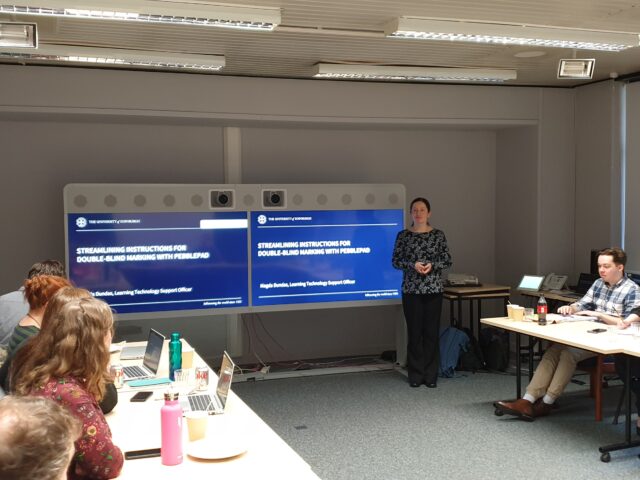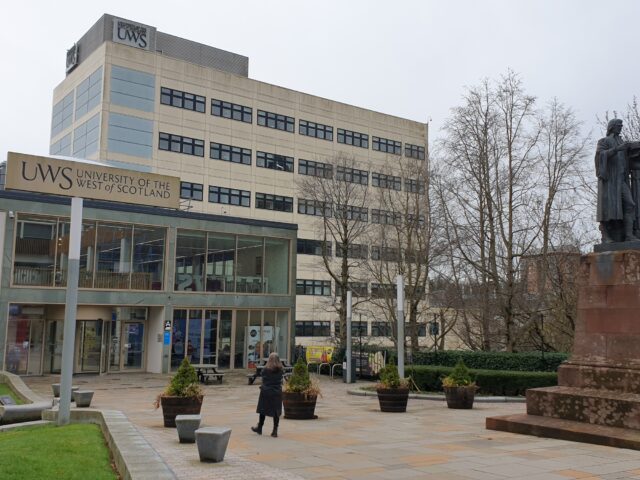PebblePaddlers in Paisley – the Scottish PebblePad User Group 2024
It could be argued, that whilst running the UoE’s PebblePad service, we exist in a bit of a bubble given that we tend to focus on supporting colleagues predominantly from within our university. However, from time to time – fuelled by our professional curiosity – we stop and wonder what interesting challenges are faced by the equivalent PebblePad service teams at other Scottish universities? Luckily, this sentiment is reciprocated which means that many of the active “PebblePaddlers” from across Scotland make the effort to get together every year as part of the Scottish PebblePad User Group meet-up.
This year the meeting was organised by PebblePad, and kindly hosted on the 13th of March 2024 by the University of the West of Scotland in Paisley (with colleagues from the UWS, QMU, Strathclyde, Glasgow and Abertay in attendance). The EDE PebblePad team was represented by Robert Chmielewski and Magda Dundas. We decided to use the event to share the latest experiences when it comes to the double-blind marking support (Magda), and our journey to date with the BlackBoard LTI (Robert).
In her presentation, Magda attempted to capture the tricky task of collating and testing instructions for the double-blind marking process. This workflow and its variations is used by some of the UoE’s schools to mark dissertations (e.g. Business, Divinity, Law). Preparing for this presentation meant revisiting the service team’s work on this to date, and re-creating the workflow step-by-step. For Magda it meant embarking on the journey to re-develop and re-organise the resources in a clearer, more accessible and helpful way. The service team, with the help of Louise Dutnell, tested the instructions to the limit.
Promoting the double-blind marking workflow in ATLAS can be challenging, especially when faced with course teams which have their established workflows in place. The paper-based double-blind marking approach tends to be common practice in most schools. As the course teams worry about the time needed to implement a digital process, presenting them with a very extensive resource is not an ideal start. Magda suggested a simpler approach – based on a ThingLink tool – where the workflow is presented as a coherent “menu” to raise “appetites” for the workflow amongst the course teams. This particular element was well received by the User Group, and provided a starting point to more detailed instructions. As this was Magda’s first appearance at a PebblePad-themed external event, we decided to take a photo of her presenting (see below) to mark the special occasion.
Except for the contents of his talk, there was very little newness to Robert’s presence at the meeting, considering that his experience in promoting PebblePad dates back to 2008. Nonetheless, he started his talk with a carefully worded “warning” that his reflections on the experiences of the Blackboard LTI are based on the work that is still “in discovery”. Indeed, although not a new development, the 1.3 version of the integration was adopted by the UoE relatively recently and coincided with the institutional move to Learn Ultra. In essence, the tool allows students to access and interact with the PebblePad resources from within Learn Ultra. Robert focussed on the dos and don’ts which the UoE’s service team has managed to identify so far. The main conclusion of his presentation pointed to the fact that PebblePad’s richness can make the LTI-based options equally complex. Hence, the positioning of the tool in any workflow needs to be planned carefully, ideally backed by a great deal of familiarity with ATLAS (one of the two key elements of PebblePad).
Overall, the meeting fulfilled its usual promise as a great platform for sharing experiences and thinking aloud of all things PebblePad. From the UoE’s service team point of view, it added to our observations around sustainability of some of the ATLAS setups and the way in which the PebblePad resources can be organised to promote usability. This certainly comes handy in time for June when both Magda and Robert expect to present at the PebblePad international conference “PebbleBash 2024” in Edinburgh (marking the 20th anniversary of the platform). Without sounding overexcited, we encourage those interested to keep an eye for another one of our blog posts – this time from the conference.

Magda Dundas presenting to a user group
The meeting was hosted by the UWS:

Entrance to the University of the West of Scotland Paisley campus where the meeting took place.
Authors:
Robert Chmielewski, Learning Technology Advisor
Magda Dundas, Learning Technology Support Officer
Photos:
(Robert Chmielewski CC-BY)
(Robert Chmielewski CC-BY)



